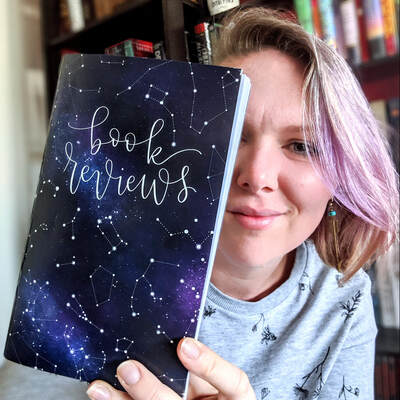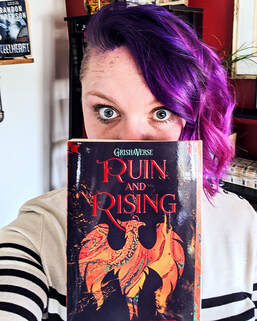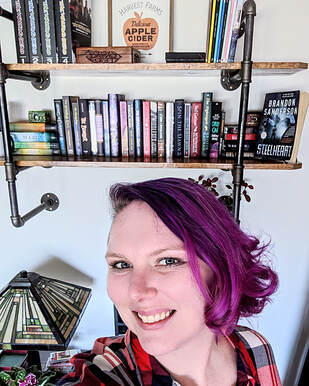 One of the questions I get frequently, booknerds, is how to write a “good” book review. The simple answer is: I can’t tell you how to make anything good since it’s subjective and I barely know what “good enough” is. I just know what I like. But! I do have some tips for you if you want to up your book review game. Book reviews are the lifeblood of the book industry no matter what level you’re at as a writer, which is why I always make a point to write a review for every book I read. But it can be time consuming and daunting if you don’t know how or where to start. So, hopefully, this will demystify some of that for you.  Let’s start with the simple book review. This is one that is maybe a few sentences in length and doesn’t go into detail about what the book is about or the character development. These are the fastest to write too, and the most common book review you’ll encounter outside of the “professional” book reviewers: people who get advanced copies of books from Netgalley, have a BookTube channel or book blog, or paid reviewers, for example. If you’re struggling for what to say, here are some really easy bullet points to cover in your review when you’re done reading: share your favorite character from the book and why you loved them (i.e. “I love Tomas because of how smart and shy he is”). Then maybe share your favorite line from the book (i.e. “I laughed when Rosslyn said…”). And end with if you enjoyed the book (i.e. “I flew through this book, really enjoyed it!”). The end! That’s like 3-4 sentences and a perfect book review! As I mentioned, longer reviews are usually ones you find from people who talk about books semi-professionally. Like me! The in-depth reviews can take a while to write, so unless you really, really want to start a blog or there was just one book series you adored and want to dissect bit by bit, don’t feel obligated to write multiple paragraphs on a book. But if you want to give it a shot, here are some thought starters for crafting those in-depth reviews: start with the broad strokes of what the book was about without spoiling anything (i.e. “this dystopian coming of age story follows a cast of 4 to save the world”). Then you can once more dive into those favorite characters and why, maybe even still share a quote or two that stuck out to you. Then, look at the story structure—did everything flow between one chapter to the next, was the action heart racing, the romance swoon worthy? Was the writing prose filled and beautiful or concise and a page turner? Was there something that bothered you about the story or characters? Then, once again, end on if you liked the book and if you were to recommend it to someone, what kind of person would enjoy this (i.e. “Perfect for anyone who likes The Hunger Games or Divergent”). Broken out, that can easily be 3-4 paragraphs and is also a perfectly awesome book review. My method is more like the second option, obviously. When I read I take bullet point type notes about the story, or if certain parts grabbed my attention. It’s easy to fall into a trap where you promise yourself you’ll remember this really awesome part, or this little thing that seems weird, but if you’re like me and enjoy reading before bed or also read more than one book at a time, it can be easy to forget something, or mix up plot lines. So I take notes on my computer first thing in the morning before I start other work, but use whatever works best for you—a journal, send yourself text messages, just whatever is easiest and natural for you. Taking these bullet points is free form, I don’t look for specific things, just parts that capture my attention, for better or worse. I, personally, don’t find reviews that just list out a book’s synopsis to be helpful, since I can read that on my own. So I usually don’t mention that outside of very broad strokes, which frees up room for me to dive deep into all those things that tickled me enough to take special note of.  I make it sound stupidly simplistic, I get that. The hardest thing is honestly making it a habit, because then you don’t have to force writing a review, and it feels natural. I also don’t write one star reviews, I’m not into trashing an author (which you should never do either, that author is a person so disagree with their work all you like, but don’t make it personal). Writing negative reviews isn’t fun, and I’m kind of anti this hate culture that seems to gravitate around some of the book review community, where it’s just fun to crap on books you were never going to like anyway. So not pressuring myself to write those reviews helps a ton. There is one exception to that rule for me: problematic content. If a book contains really triggering content that is used dangerously, or inappropriately, I will give that book a one star because that content has to be depicted carefully, and should be treated with the respect it deserves. Hopefully this was at least semi helpful? But if you have specific questions, just pop it into the comments. Writing reviews is hard, but much appreciated! And remember, you never have to justify why you felt a book was 3 stars when everyone else is giving it a 5. Tastes vary, and sometimes a book isn’t wowing you at that particular moment as it is for others and that is 1000% fine and valid. As long as you don’t attack an author personally, you are allowed to say and feel however you want about a story, and rate and review it accordingly, my friend!
3 Comments
Debra Guyette
4/3/2020 03:28:38 am
Good advice. I shall take it into consideration.
Reply
CE
4/3/2020 11:03:26 am
I'm so glad you found it helpful!
Reply
Leave a Reply. |
Archives
April 2023
|
 RSS Feed
RSS Feed